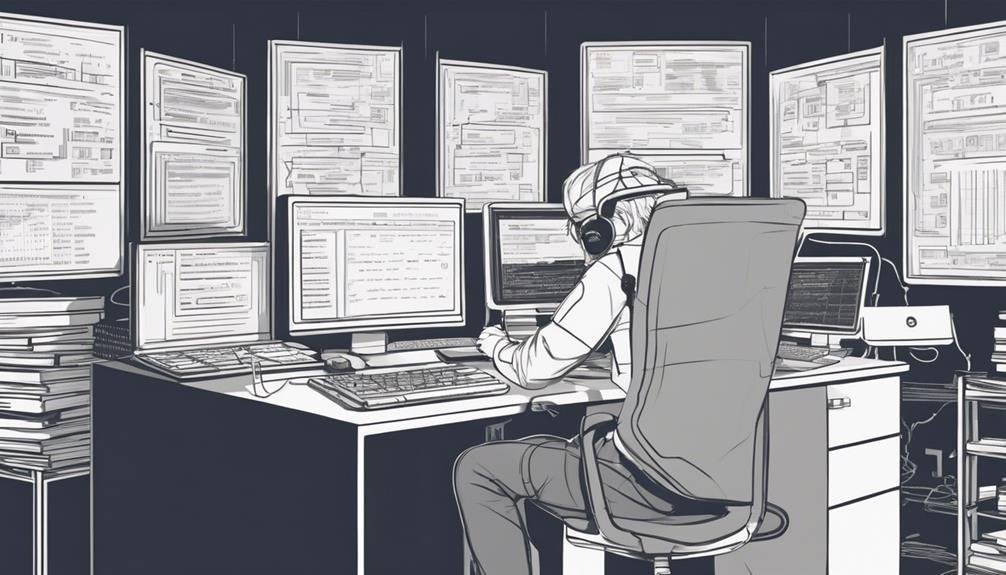To master game development, you need technical programming proficiency in languages like C++, Python, and C#, coupled with a grasp of algorithms and game engines like Unity. Understanding math and physics concepts such as vectors, matrices, and probability theory is essential for realistic game simulations. Problem-solving skills with debugging tactics like breakpoints and logical thinking are vital. Computer graphics modeling expertise in software such as Blender and Maya is necessary for creating stunning visuals. Finally, effective teamwork and adaptability will help you navigate challenges and foster creativity. A diverse skill set awaits for those aspiring to excel in game development.
Key Takeaways
- Proficiency in programming languages like C++, Python, and C#
- Understanding of algorithms, data structures, and object-oriented programming
- Knowledge of computer graphics modeling and animation techniques
- Mastery of mathematics and physics principles for game simulations
- Effective teamwork, communication, and adaptability for collaborative game development
Technical Programming Proficiency

When delving into the field of game development, technical programming proficiency stands as the cornerstone of your success. As video game developers, mastering programming languages such as C++, Python, and C# is essential for bringing your game ideas to life. Understanding algorithms, data structures, and object-oriented programming is essential for creating efficient game mechanics that provide a seamless player experience. Additionally, proficiency in game engines like Unity and Unreal Engine is necessary for developing immersive gameplay experiences that captivate your audience.
Moreover, having knowledge of debugging tools and techniques is important for identifying and fixing errors in your code, ensuring a polished final product. Continuous learning is key in this dynamic field, as staying updated with new technologies and industry trends is crucial for mastering technical programming skills in game development. By honing your technical skills and embracing a mindset of continuous improvement, you pave the way for success in the ever-evolving world of game development.
Mathematics and Physics Understanding
Developing a profound understanding of mathematics and physics principles is essential for honing your skills in game development. Understanding physics principles like gravity, collisions, and velocity is vital for creating realistic game mechanics. When you apply mathematical concepts such as vectors, matrices, and trigonometry, you enhance the precision of your game development. Mastery of algebra and calculus enables you to craft complex game simulations and algorithms, elevating the depth of your creations. Knowledge of probability theory is pivotal for implementing random events and determining game outcomes, adding an element of unpredictability. Additionally, proficiency in geometry and spatial reasoning is necessary for designing intricate game environments and objects, ensuring a visually appealing and engaging gaming experience. Embrace the power of mathematics and physics in game development to open up a world of endless possibilities and innovative creations.
Problem-Solving and Debugging Tactics

To excel in game development, mastering problem-solving and debugging tactics is crucial. When confronting coding issues, your problem-solving skills will be put to the test. Debugging is a vital process that involves identifying and resolving errors in the code efficiently. Here are some key points to help you enhance your debugging skills:
- Utilize breakpoints strategically to pause code execution at specific points for thorough examination.
- Incorporate print statements in your code to output specific variables' values and track the flow of the program.
- Make use of debugging tools such as profilers and interactive debuggers to pinpoint and rectify bugs effectively.
Effective problem-solving in game development demands logical thinking, attention to detail, and persistence. By mastering debugging techniques, you ensure the development of high-quality games that offer players a seamless gaming experience. Keep honing your skills to overcome coding challenges and deliver exceptional gaming experiences.
Computer Graphics Modeling Mastery
Mastering computer graphics modeling is an essential skill set for game developers seeking to create visually engaging and immersive gaming experiences. When delving into computer graphics modeling, understanding the creation of both 2D and 3D assets is fundamental. Moreover, grasping concepts like lighting, textures, and shaders is crucial for achieving realistic graphics in games. Proficiency in software such as Blender, Maya, or ZBrush can significantly enhance your modeling skills for game assets. It is essential to optimize polygon count and texture resolution to strike a balance between visual quality and game performance. Additionally, learning animation techniques can complement your modeling skills by enabling the creation of dynamic and interactive game elements.
| Computer Graphics Modeling | Key Points |
|---|---|
| 2D and 3D assets | Creation essential for game environments |
| Lighting, Textures, Shaders | Understanding crucial for realistic graphics in games |
| Blender, Maya, ZBrush | Proficiency in software enhances modeling skills for game assets |
Effective Teamwork and Adaptability

When working on game development projects, effective teamwork and adaptability play an important role in achieving success. Collaborating with diverse team members enhances creativity and problem-solving skills, while adapting to changing project requirements and technology trends is vital for staying relevant.
- Effective Communication: Fostered through teamwork, communication guarantees cooperation and synergy among developers, artists, and designers.
- Innovative Game Features: Embracing different perspectives and ideas from team members leads to the creation of original game features and designs.
- Adaptability Skills: Developing adaptability skills enables game developers to navigate challenges and opportunities in dynamic gaming environments.